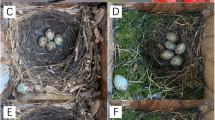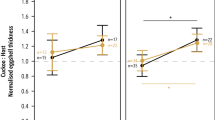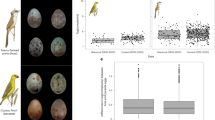Abstract
Although the cuckoo Cuculus canorus parasitizes a variety of hosts, individual females are thought to favour just one species and they lay eggs coloured to match, more or less accurately, those of their particular host1–3. The mechanisms underlying this division of females into strains, or gentes, specializing on different hosts are unknown. From a study of museum collections we show that the eggs of British cuckoo gentes are statistically different and, using model eggs, we show by experiment that host discrimination against badly matching eggs is a selective force in gens maintenance and that cuckoos lay a better mimetic egg where the host species is apparently more discriminating.
This is a preview of subscription content, access via your institution
Access options
Subscribe to this journal
Receive 51 print issues and online access
$199.00 per year
only $3.90 per issue
Buy this article
- Purchase on SpringerLink
- Instant access to full article PDF
Prices may be subject to local taxes which are calculated during checkout
Similar content being viewed by others
References
Baker, E. C. S. Cuckoo Problems (Witherby, London, 1942).
Wyllie, I. The Cuckoo (Batsford, London, 1981).
Chance, E. P. The Truth about the Cuckoo (Witherby, London, 1940).
Brooke, M. de L. & Davies, N. B. J. Anim. Ecol. 56, 873–883 (1987).
Davies, N. B. & Brooke, M. de L. Anim. Behav. 36, 262–284 (1988).
Chance, E. P. The Cuckoo's Secret (Sidgwick & Jackson, London, 1922).
Southern, H. N. in Evolution as a Process (eds Huxley, J., Hardy, A. C. & Ford, E. B.) 219–232 (Allen & Unwin, London, 1954).
Baker, E. C. S. Ibis 1913, 384–398 (1913).
Swynnerton, C. F. M. Ibis 1918, 127–154 (1918).
Rensch, B. J. Orn. 72, 461–472 (1924).
Davies, N. B. & Brooke, M. de L. J. Anim. Ecol. (in the press).
Rothstein, S. I. Am. Nat. 109, 161–175 (1975).
Chaucer, G. The Parliament of Foules (1382) in The works of Geoffrey Chaucer (ed. Pollard, A. W.) (Macmillan, London, 1913).
Kelly, C. J. theor. Biol. 125, 283–299 (1987).
Wallace, A. R. Darwinism: an Exposition of the Theory of Natural Selection with Some of its Applications (Macmillan, London, 1889).
Mason, P. & Rothstein, S. I. Am. Nat. 130, 161–167 (1987).
Kornerup, A. & Wanscher, J. H. Methuen handbook of colour (Methuen, London, 1967).
Author information
Authors and Affiliations
Rights and permissions
About this article
Cite this article
de L. Brooke, M., Davies, N. Egg mimicry by cuckoos Cuculus canorus in relation to discrimination by hosts. Nature 335, 630–632 (1988). https://doi.org/10.1038/335630a0
Received:
Accepted:
Issue Date:
DOI: https://doi.org/10.1038/335630a0
This article is cited by
-
Fledgling discrimination in the hoopoe, a potential host species of the great spotted cuckoo
Behavioral Ecology and Sociobiology (2023)
-
Thicker eggshells are not predicted by host egg ejection behaviour in four species of Australian cuckoo
Scientific Reports (2022)
-
Asymmetric sibling rivalry extends to hosts and brood parasites
Behavioral Ecology and Sociobiology (2022)
-
Nestling discrimination and feeding habits during brooding of Chestnut Thrushes
Avian Research (2020)
-
Potential cuckoo hosts have similar egg rejection rates to parasitized host species
Avian Research (2020)




